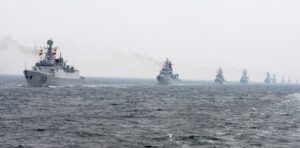If you read only one book on global politics and strategy this year, make it this one.
The author, Bruce D. Jones (bio here), has an academic background and has worked for the U.N., World Bank, and is currently at the Brookings Institution. He’s been a fellow at Stanford, Princeton, Yale, and New York University. Shorter version: He’s a strategic thinker, and a very well-informed one.
“To Rule the Waves,” as the title suggests, is principally about naval strategy and the history of navies from ancient times to the present. But it also discusses globalization, the importance of containerization to global trade, and climate change. All of these things weave together and are interdependent on each other.
China’s rise as a naval power is the central topic of this book. Jones writes, “China’s return to the high seas for the first time in five hundred years — a move with both commercial and strategic logic — is the geopolitical equivalent of an earthquake. And it has triggered a tsunami whose shape is just starting to become visible.”
The book is up to date in its coverage of new military technologies, and paints a clear picture of the current and developing strategic situation in the western Pacific — the area that includes Japan, South Korea, Philippines, Australia, India and, of course, Taiwan (which produces nearly all of the world’s advanced computer chips). Jones also explains the thinking of the Chinese leadership: How they’re influenced by history, and by their country’s weaknesses and vulnerabilities.
Reading this book brings everything into clear focus: The sea routes, Britain’s historic role and America’s current role in defending them; the rise of global trade; and the escalating rivalry between the Russia-China axis (in which Beijing is the dominant partner) and the U.S.-led democracies. Jones doesn’t burden readers with jingoism or a political agenda; his book is a factual portrayal of the way the world is, how it’s changing, and the challenges we’re going to face.
While this is not a political book, and Jones is no rightwinger, he makes a convincing case for sufficient military spending to counter China’s very rapid military buildup (Democrats won’t like that), and for confronting and dealing with climate change (Republicans won’t like that). And he warns that Russia’s invasion of Ukraine is just the Putin-Xi partnership’s opening move against western military and economic power.
(Jones argues Russia couldn’t have invaded Ukraine without China’s consent, and notes that Putin and Xi met in Beijing during the Winter Olympics just days before the invasion began. While athletes were competing, America’s two main adversaries were plotting behind the scenes to topple America’s military and economic dominance.)
If you think about America’s role in the world, military strategy, and economics, read this book. If you don’t, get out of the way of people who do. What you don’t know will hurt you less if American policy is guided by people who understand how the world is shifting under our feet. Jones is one of those people.
Photo below: Under President Xi Jinping, China is rapidly building a world-class navy with the aim of pushing the U.S. Navy out of the western Pacific
